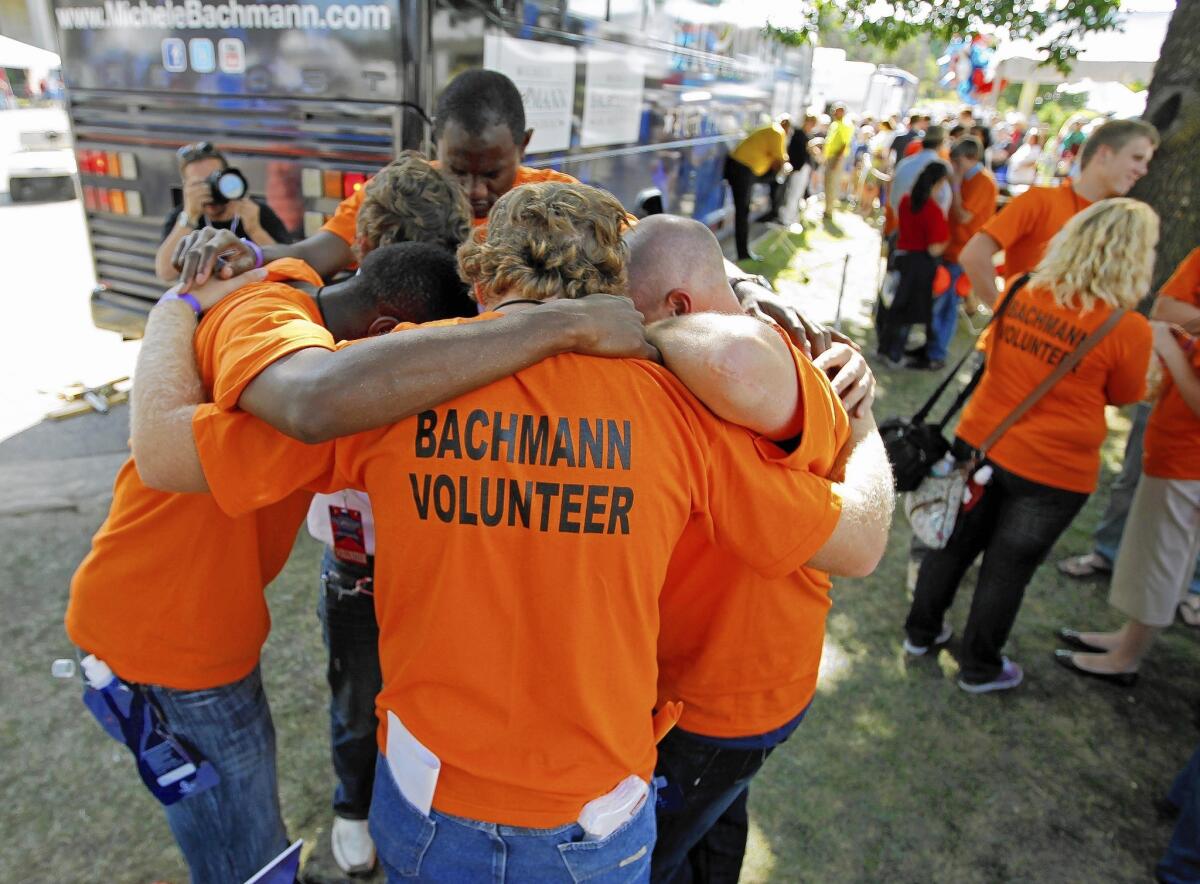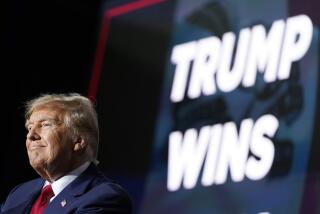Republicans question Iowa’s key role in presidential balloting

DES MOINES — For more than 40 years, Iowa voters have played a vital role in picking the nation’s president, culling the field of hopefuls and helping launch a fortunate handful all the way to the White House.
For about 35 of those years, Iowa has been the target of jealousy and scorn, mainly from outsiders who say the state, the first to vote in the presidential contest, is too white and too rural; that its caucuses, precinct-level meetings of party faithful, are too quirky and too exclusionary to play such a key role in the nominating process.
Now, a swelling chorus of critics is mounting a fresh challenge to Iowa’s privileged role, targeting especially the August straw poll held the year before the election, which traditionally established the Republican Party front-runner. Increasingly, critics say, the informal balloting has proved a meaningless and costly diversion of time and money. Some GOP strategists are urging candidates to think hard before coming to Iowa at all.
“A monster has been created,” said Charlie Cook, a nonpartisan election analyst once so enamored of the caucuses he brought his family here for a politically themed summer vacation. He points to the growing influence of interest groups that press their agendas at the expense of what used to be a more neighbor-to-neighbor style of campaigning.
“The process has become increasingly contrived and manipulated,” Cook said, “losing its effectiveness of being a surrogate for voters across the country.”
For Republicans, the last two elections have given further reason to gripe. The caucus winners, former Arkansas Gov. Mike Huckabee in 2008 and ex-Pennsylvania Sen. Rick Santorum in 2012, were favorites of Christian conservatives but came nowhere close to capturing their party’s nomination. More embarrassing, problems with the 2012 count resulted in the wrong candidate, Mitt Romney, initially being declared the GOP winner. (The tally was fixed about two weeks later.)
In response, establishment Republicans, including the governor, have called for scrapping the summer straw poll — a lucrative franchise for the state party, as candidates pay handsomely to compete — and have moved to assert greater control over the party-run caucuses. (The winner of the 2011 poll was Rep. Michele Bachmann of Minnesota, who finished sixth in the real Iowa balloting and quit the presidential race the next day.)
“I want to preserve the Iowa caucuses,” Gov. Terry Branstad said bluntly in an interview in his ceremonial office, surrounded by portraits and busts of his predecessors — even if that means ending the straw poll and fighting the leadership of the state Republican Party.
“I think it’s a great event,” countered A.J. Spiker, chairman of the Iowa GOP, who said it should be up to candidates to choose whether to participate in the Ames straw poll. “It’s really a good kickoff to the caucus season.”
Iowa’s starting role on the campaign calendar appears safe for now. Republicans have once more placed the caucuses at the head of the nominating calendar, to be followed by New Hampshire’s traditional leadoff primary. Democrats are expected to follow suit. President Obama’s 2008 caucus win helped send him to the White House, and he carried the state twice in the general election, so there is no clamor to tinker with the party’s selection process or downgrade Iowa’s import.
Still, the fight on the Republican side is more than an arcane scheduling matter, or a case of one-upmanship among states eager for some of the attention showered on Iowa. Reflecting the party’s broader philosophical rift, some express concern that the straw poll and caucuses have become a captive of the Christian conservative and tea party wings of the GOP.
“If you want your campaign to be defined entirely on social issues, start your campaign in Iowa because that’s what you’re going to spend most of your time talking about,” said Katie Packer Gage, a strategist for Romney’s 2012 campaign, who is leading an effort to broaden the GOP’s appeal among women. “I’m pro-life and work for pro-life candidates, but I don’t necessarily think it’s a winning strategy for the party for that to be the core message we’re campaigning on day in, day out. We need a broader message to win elections.”
Scott Reed, who managed Republican Bob Dole’s 1996 presidential campaign and is now a senior campaign strategist for the U.S. Chamber of Commerce, said he, too, would counsel GOP candidates to carefully consider whether to compete in Iowa. (Dole won the caucuses both times he ran for president, in 1988 and 1996.)
A key test, Reed said, will be this year’s campaign for an open U.S. Senate seat. “All eyes will be on whether [Iowa Republicans] can pick a candidate who wins in the fall and not just check ideological boxes,” Reed said.
Caucus veterans have heard it all — or at least a variation — before. Any time a party loses the White House, the blame-laying focuses on its message, which some deem too extreme, and the process, which critics call unrepresentative, said David Yepsen, who covered numerous caucus campaigns for the Des Moines Register and now teaches at Southern Illinois University. “That said,” he added, “both parties in Iowa are sensitive to the criticism and have taken steps every four years to make it a little better.”
To that end, the state GOP is weighing changes aimed at ensuring the integrity of the 2016 caucuses and preventing the party from prematurely declaring a winner.
More contentious is Branstad’s effort to seize control of the state party, currently run by libertarian-leaning backers of former presidential hopeful Ron Paul. (Paul’s son, Rand, a senator from Kentucky, is a likely 2016 contestant.) Members of the central committee, up for election next month, will decide the fate of the straw poll and take charge of the caucuses.
“We want maximum participation from candidates who represent the whole broad spectrum of our party,” said Jeff Boeyink, Branstad’s former chief of staff and a senior advisor to his reelection campaign.
To some, that is a thinly veiled attempt to lessen the power of social conservatives. “Moral issues rule. Economic issues come in second,” said Jamie Johnson, a committeeman from central Iowa who helped lead Santorum’s 2012 campaign. “That’s how Iowa rolls.”
More to Read
Start your day right
Sign up for Essential California for news, features and recommendations from the L.A. Times and beyond in your inbox six days a week.
You may occasionally receive promotional content from the Los Angeles Times.







